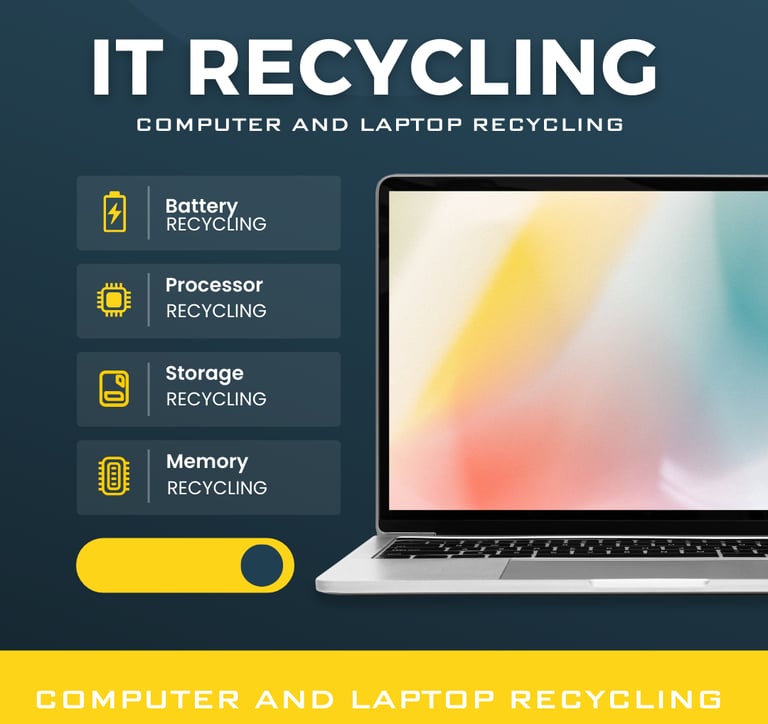Free and Eco Friendly IT Recycling in London, Herdfordshire and Bedfordshire
COMPUTER RECYCLING SERVICE
From consulting and strategy development to implementation and support, our comprehensive services can help your business thrive.
Join Us in Making a Difference
Every device recycled helps reduce e-waste and protects the environment. Partner with us to create a greener, more sustainable world.
EcoReboot IT Recycling
Sustainable Computer Recycling Solutions
Recycle your computers responsibly with our professional and secure IT recycling services.
Recycling your computer is not just an act of environmental responsibility; it also protects your sensitive data while contributing to a circular economy. By choosing a professional and trusted recycling service, you’re making a sustainable choice for both yourself and the planet!
Device Collection
Offer flexible ways for customers to hand over their old computers and electronics:
Drop-Off Locations: Designated spots where users can bring their devices.
Pickup Services: On-demand collection of old devices from homes or offices.
Mail-In Option: Customers can ship their old computers to your facility.
Data Security
Ensure complete privacy for your customers by providing:
Secure Data Wiping: Using certified software to erase all data from hard drives.
Hard Drive Destruction: Physical shredding or degaussing of drives for maximum security.
Certification: Issue certificates of data destruction for businesses and individuals.
Device Sorting and Testing
Assess the condition of collected devices to determine the next steps:
Functional Devices: Separate working computers for refurbishment or donation.
Non-Functional Devices: Identify parts that can be salvaged or recycled.
Refurbishment and Repurposing
Give new life to functional devices:
Repair and Upgrade: Replace damaged parts or upgrade components to improve performance.
Sell or Donate: Resell refurbished devices at affordable prices or donate to schools, charities, or low-income families.
Refurbishment and Repurposing
Give new life to functional devices:
Repair and Upgrade: Replace damaged parts or upgrade components to improve performance.
Sell or Donate: Resell refurbished devices at affordable prices or donate to schools, charities, or low-income families.
Recycling and Material Recovery
Dismantle non-functional devices to extract valuable materials:
Component Recovery: Harvest reusable parts like RAM, CPUs, and screens.
Material Recycling: Extract metals (gold, silver, copper), plastics, and glass for manufacturing.
Safe Disposal: Dispose of hazardous materials like batteries and circuit boards responsibly.
COMPUTER RECYCLING SERVICE
1: Collection
The process begins by gathering old or unused computers and related devices from individuals, businesses, or organizations.
Methods of Collection:
Drop-off at designated recycling centers.
Scheduled pickup services from homes or offices.
Mail-in programs for convenience.
2: Sorting
Once the devices are collected, they are sorted based on their condition:
Working Devices: Checked for potential reuse or refurbishment.
Non-Working Devices: Segregated for dismantling and material recovery.
3: Data Security
Ensuring customer data privacy is a critical steps
Data Erasure: Securely wipe data from hard drives using certified software.
Physical Destruction: Shred or degauss hard drives if the device cannot be reused.
Certification: Provide proof of data destruction for peace of mind.
4: Refurbishment
Functional or repairable devices are given a new lease on life:
Testing: Check components like CPUs, RAM, and motherboards for functionality.
Repairs: Fix broken parts and upgrade older devices.
Redistribution: Refurbished computers are sold or donated to schools, non-profits, or low-income individuals.
5: Dismantling and Recycling
Non-repairable devices are dismantled to extract reusable materials:
Component Harvesting: Salvage valuable components like hard drives, memory, and power supplies.
Material Recovery: Separate materials such as metals, plastics, and glass for recycling.
Hazardous Material Handling: Safely dispose of toxic components, like batteries and mercury-containing parts.
6: Material Processing
Recovered materials are sent to specialized facilities:
Metal Refining: Extract precious metals like gold, silver, and copper.
Plastic Recycling: Process plastics into pellets for manufacturing new products.
Glass Reuse: Recycle glass from screens and monitors.
7: Safe Disposal
Components that cannot be recycled are disposed of responsibly:
Compliance: Follow local and international e-waste disposal regulations.
Landfill Diversion: Minimize waste sent to landfills to reduce environmental impact.
8: Reporting and Awareness
Transparency is key to building trust and promoting sustainability:
Reports: Provide detailed recycling reports for businesses and organizations.
Education: Raise awareness about the importance of recycling and reducing e-waste.
How Computer Recycling Works
What is Computer Recycling?
Computer recycling involves the responsible collection, processing, and disposal of computers and electronic devices. This process ensures that valuable materials are recovered, hazardous waste is handled safely, and functional devices are given a second life through refurbishment.
Good Things About Computer Recycling
Protects the Environment:
Keeps harmful materials like lead, mercury, and cadmium out of landfills and water sources.
Reduces the need for mining raw materials by recovering metals like gold, copper, and aluminum.
Reduces E-Waste:
Computers are among the largest contributors to electronic waste (e-waste). Recycling prevents these devices from polluting the environment.
Supports Sustainability:
Refurbishing and reusing old devices reduces the energy and resources needed to manufacture new products.
Creates Economic Opportunities:
Recycling generates jobs in the collection, processing, refurbishment, and resale of electronic devices.
Promotes Affordability:
Refurbished computers provide low-cost options for individuals, schools, and non-profits, bridging the digital divide.
Data Safety in Computer Recycling
A common concern with recycling computers is the security of sensitive data. A professional recycling service ensures that your data is completely erased or destroyed before devices are reused or dismantled.
Secure Data Wiping:
Certified software is used to overwrite data on hard drives, making it unrecoverable.
Physical Destruction:
For devices that cannot be reused, hard drives are physically destroyed through shredding or degaussing.
Certificates of Data Destruction:
Businesses and individuals receive proof that their data has been securely erased or destroyed, giving peace of mind.
Compliance with Privacy Laws:
Professional recyclers follow strict regulations like GDPR (in the UK/EU) or other local data protection laws to ensure privacy.
Why Choose Professional Computer Recycling?
Safety: Avoid improper disposal, which can lead to environmental pollution and data breaches.
Convenience: Many services offer pickups, drop-offs, or mail-in options.
Trust: Certified recycling centers adhere to industry standards for environmental safety and data destruction.
Our offices
EcoReboot IT Recycling
26 WATFORD WAY ,NW4 3AD
Hours
Monday - Friday
9am - 6pm
Contacts
01234798650 Bedforshire
01992820587 Hertford
02072052548 Central
02082264916 Greator London Full
Recycling@EcoReboot.co.uk
Info@EcoReboot.co.uk
EcoReboot IT Recycling
THE PARK ESTATE 4C, LU1 1HE
LUTON
Hours
Monday - Friday
9am - 6pm
Contacts
01234798650 Bedforshire
01992820587 Hertford
02072052548 Central
02082264916 Greator London Full
Recycling Services: Recycling@EcoReboot.co.uk
General Inquiries: Info@EcoReboot.co.uk
Get in touch
Share with visitors how they can contact you and encourage them to ask any questions they may have.


SERVICES
Data Destruction
EcoReboot IT Recycling , we specialize in responsible IT recycling, offering eco-friendly and secure solutions for laptops, computers, and electronic devices. Serving businesses, schools, and individuals across all of London, we ensure data protection, secure destruction, and environmentally-friendly disposal. Recycling made easy—secure, sustainable, and reliable.
LINKS


Contact
EcoReboot IT Recycling
The Park Estate 4C
BURY PARK ROAD
LU1 1HE LUTON
01234798650 Bedfordshire
01992820587 Hertfordshire
26 WATFORD WAY ,NW4 3AD
HENDEN LONDON
Hours
Monday - Saturday
9am - 8pm
Contacts
02072052548 Central
02082264916 Greater London
Recycling Services: Recycling@EcoReboot.co.uk
General Inquiries: Info@EcoReboot.co.uk
